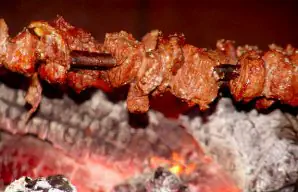Posted on Monday, June 22, 2020 in
Beef Recipes
Delicious Beef Croquettes Recipe
These easy and delicious beef croquettes (croquetes de carne), can be made with just about any type of meat, these ones use beef.
| Preparation time | 15 min |
| Cooking Time | 45 min |
| Ready In | 1 h |
| Level of Difficulty | Easy |
| Servings | 6 |
Ingredients
1 and 1/2 cups of ground beef4 tablespoons + 1 tablespoon of butter2 garlic cloves, chopped2 ounces of chopped chourico1 bay leaf1 tablespoon of chopped parsley3/4 cup of milk1 onion, chopped3 ounces of flour (about 85 grams)Lime juice (to taste)Salt and pepper (to taste)2 eggs, beatenBread crumbs, for sprinkling on topOil, to fry1 lime, cut into quarters
Get Portuguese ingredients 
Preparation
This recipe makes about 20 Croquettes
- In a large frying pan start cooking 4 tablespoons of the butter, the garlic, bay leaf and chouriço and stir and heat through.
- Add the ground beef and season with salt and pepper.
- Continue frying while crushing the beef with a fork so it remains loose and doesn’t clump.
- When the meat is fried, add the chopped parsley and stir.
- Remove the bay leaf and turn off the heat.
- In a separate pot, add the remaining butter and onion and let it cook on medium heat without letting it brown.
- Add the flour to the pot and stir well, gradually adding the milk while stirring.
- Season with a pinch of salt, pepper and lemon juice to taste.
- Add the meat to the this mixture and mix well.
- Stir until it is well mixed and then turn off the heat.
- Remove from the pot, place in a bowl and let cool.
- When the mixture has cooled, mold croquettes out of it and place on a plate previously coated with flour.
- Coat the croquettes with the beaten eggs and then coat them in the breadcrumbs.
- Now fry the croquettes one by one in a deep frying pan over high heat in the oil.
- Once golden, remove them with a slotted spoon and place them on a plate with paper towels.
- Let them cool for a minute and once you are done, cut a lime into quarters to serve on a platter.
Recipe Credit: easyportugueserecipes.com
Photo Credit: chefjar.com
Recommended Recipes
Yummy Marinated Beef Skewers Recipe
These yummy marinated beef skewers (espetadas de carne), most typically use beef, although you can use other meats and vegetables.
| Level of Difficulty | Easy |
| Servings | 4 |
Grilled Veal Steaks with Port Wine Sauce Recipe
Succulent grilled veal steaks with Port wine sauce recipe, smothered in rich, creamy mushrooms, perfectly indulgent, irresistibly savory, and guaranteed to impress everyone.
| Level of Difficulty | Easy |
| Servings | 4 |
Gorete's Cottage Pie (Empadão de Carne) Recipe
Gorete's cottage pie (empadão de carne), I've tried different versions of cottage pie and this is definitely a family favorite.
| Level of Difficulty | Easy |
| Servings | 6 |
Comments
There are no comments for this recipe.



